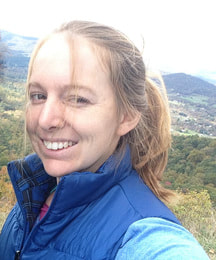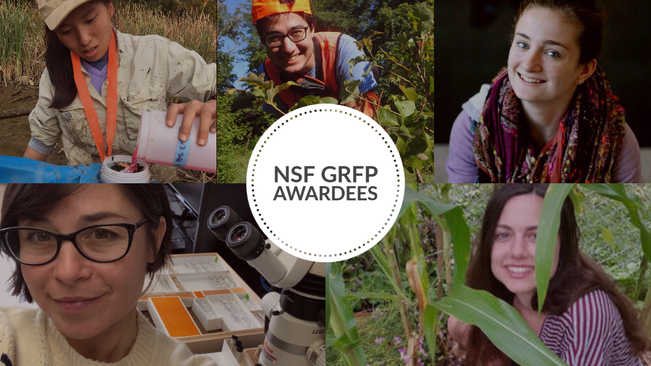|
Trio from Pick Lab, Faculty Assistant Jessica Hernandez, Prof and Chair Leslie Pick and Grad Student Katie Reding, look into using a new study organism to discover novel genes and mechanisms. Their findings conclude that harlequin bugs are a versatile insect model, effective for examining gene expression. The Pick Lab takes us through their discovery, from rearing harlequin bugs in the lab to where they see molecular genetic analysis of harlequin bugs leading. Learn more in their latest paper out this month in EvoDevo "Oncopeltus-like gene expression patterns in Murgantia histrionica, a new hemipteran model system, suggest ancient regulatory network divergence."
https://evodevojournal.biomedcentral.com/articles/10.1186/s13227-020-00154-x Congratulations to Professor Maile Neel on receiving the Edward T. LaRoe III Memorial Award from the Society for Conservation Biology (SCB). Given to individuals who have been “a leader in translating principles of conservation biology into real-world conservation”, Neel is recognized for her work translating her research on species recovery and genetic diversity into practical applications for restoration managers. Follow link to see SCB’s announcement with more on Neel's work being released by SCB in the near future.
https://conbio.org/publications/scb-news-blog/scb-announces-award-winners-for-outstanding-contributions-to-biodiversity-c Congratulations to Max Ferlauto (MS student, Burghardt Lab) on being named 2020 Smithsonian Institute Fellow (SIFP) and Joan Mosenthal DeWind Awardee. These awards will help fund his studies into Lepidoptera conservation, with the SIFP award supporting Max's work at Smithsonian Environmental Research Center this upcoming summer. See below for the Xerces Society press release on the DeWind Award and further information on Max's research.
https://xerces.org/blog/announcing-2020-dewind-awardees?utm_source=Enews+April+2020+%231&utm_campaign=April+Enews+1&utm_medium=email When work from home orders were declared many of us left University of Maryland campus with the essentials. For Todd Waters, Ag Tech and UMD Insect Zookeeper, this meant bringing home some of the insects he cares for. He tells NPR All Things Considered that he is now housing spiders, assassin bugs, mantis, scorpions and tarantulas, just to name a few. Todd Waters is now engaging a new insect zoo audience, his roommates! Listen here, https://www.npr.org/…/bring-home-the-tarantulas-as-research…
Grad Student Darsy Smith and Professor Bill Lamp have an article out in a special edition of University of Maryland Extension's Agronomy News entitled, "Unexpected Outbreak of Cowpea Aphid in Alfalfa." Although outbreaks have been observed in the past, they warn that this outbreak, discovered by Terry Patton (Dively Lab), is considerable in size and extent. Follow link to see their guidance on identifying, monitoring and reporting this crop damaging pest.
https://extension.umd.edu/…/a…/2020%20April_Pest%20Alert.pdf Professor Emeritus Michael Raupp collaborates with researchers Ashley N. Schulz, Angela M. Mech, Craig R. Allen, Matthew P. Ayres and others to develop standardized tools for determining non-native insect impact. They are optimistic that standardized assessment tools can build consensus among experts, which in turn, could improve managers and policy makers' response to the threats imposed by non-native species. Their findings were published this month in NeoBiota. Follow link for publication, "The impact is in the details: evaluating a standardized protocol and scale for determining non-native insect impact"
https://neobiota.pensoft.net/article/38981/  Entomology Ph.D. candidate Maggie Lewis (Hamby Lab) has been awarded an Ann G. Wylie Dissertation Fellowship from the University of Maryland’s Graduate School. Awarded to students in the final stages of their doctorate, the Wylie Fellowship provides one semester of support during the 2020-2021 year. Maggie’s dissertation research studies various aspects of the biology and management of spotted-wing drosophila (SWD), particularly its interactions with yeasts and plant pathogenic fungi. She also examines how insecticide spray coverage impacts SWD management and is trying to understand how to improve spray coverage within bramble production systems. "This is a well-deserved award. Maggie has worked hard for it” said Kelly Hamby, Assistant Professor & Extension Specialist. “Maggie has made significant contributions to furthering integrated pest management programs for SWD. We are thrilled her work is being recognized in this way." Please join us in congratulating Maggie on being named recipient of this award. Postdoc Alina Avanesyan and Professor Bill Lamp have another publication out on the invasive lanternfly. The paper entitled, "Use of Molecular Gut Content Analysis to Decipher the Range of Food Plants of the Invasive Spotted Lanternfly, Lycorma delicatula" was published in Insects special issue "Molecular Gut Content Analysis: Deciphering Trophic Interactions of Insects.” Their study is the first to show that host plant DNA can be identified within the gut contents of the spotted lanternfly. Molecular gut content analysis provides insight into the feeding behavior of lanternflies at all developmental stages and can be helpful in predicting host plant range. This research could improve the monitoring and management of this invasive species.
https://www.mdpi.com/2075-4450/11/4/215 |
Categories
All
Archives
June 2024
|
Department of Entomology
University of Maryland
4112 Plant Sciences Building
College Park, MD 20742-4454
USA
Telephone: 301.405.3911
Fax: 301.314.9290
University of Maryland
4112 Plant Sciences Building
College Park, MD 20742-4454
USA
Telephone: 301.405.3911
Fax: 301.314.9290


 RSS Feed
RSS Feed




